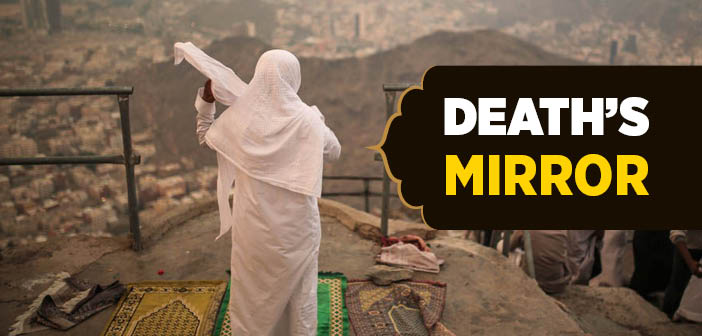What are the mistakes made when visiting gravres? What are the mistakes made when visiting tombs?
Tying pieces of cloth on trees surrounding graves or tombs, sticking stones, throwing money, sprinkling salt, sacrificing animals in their gardens or at their entrances, burning candles, or asking from the deceased are all wrongs when it comes to visiting graves and tombs.
Tying votive pieces of cloth at graves is a Shamanic practice. According to Shamanic belief, every mountain, every spring, lake and river, large tree and rock has a spirit cohabitant. These spirits demand sacrifices from people and punish those who do not offer such sacrifices. But these spirits are not difficult to please, being appeased with a rag, a knot of horsehair, or even a stone cast as an offering.
Tying pieces of cloth to graves and the superstitious throwing of certain objects stem from such falsehoods. Unfortunately, traces of such erroneous rituals can still be observed among ignorant people.
Failing to show the necessary sensitivity in the avoidance of such superstitions will subject the slave to great agony and torment in the Next World, for the doctrine of divine oneness and unity has no toleration whatsoever for even the slightest partnership.
The following incident transmitted by Salman al-Farsi suffices to reveal the seriousness of this matter:
“One of two men who once travelled together was granted entry into the Garden because of a fly, while the other entered Hellfire because of it. Their journey led them to a people who used to worship idols. The idol worshipers compelled every passer-by to make an offering to their gods.
When the two men arrived, the idol worshippers said to them, ‘You must make an offering to our gods!’ One of the men replied, ‘I have nothing to offer!’
They said, ‘You can sacrifice anything. Even a fly will do!’ The man consented. So, he caught a fly and sacrificed it before their gods and thus became one of the people of the Fire.
When the idol worshipers demanded the same thing from his companion, he replied, ‘I will not make an offering to anyone except Allah Almighty.’ The idol worshippers killed him and so when he died, he entered the Garden.” (Abu Nu’aym, Hilya, I, 203)
Lighting candles at graves is a holdover custom from fire worshippers;
Circumambulating the graves of the righteous, as one would the Ka’ba;
Drawing pictures of things on the doors of tombs that one seeks to have in the life of the world, such as houses, cars, or children;
Throwing soil or coins, or sticking paper money at tombs; and
Kissing tombs, touching them, bowing when entering them and entertaining the belief that any of their problems will be solved or wishes granted in these ways, are all objectionable acts with respect to Islamic belief.
It should not be forgotten that human beings are by nature helpless and weak. Everyone and everything is in need of Allah. If the person whose grave is visited is thought to be a righteous Muslim and a friend of Allah, there is no harm in entreating Allah Almighty for their sake. That is to say, one’s prayer can be directed to Allah by using that righteous figure as a means but on no account must anything be sought directly from the deceased themselves.
Whenever there was drought during his Caliphate, ‘Umar ibn al-Khattab would take the Messenger’s uncle al-‘Abbas ibn ‘Abdulmutalib with him for the rain prayer. He would entreat Allah saying:
“O Allah, we seek intercession with You by Your Messenger and we ask You for rain. We seek intercession with You by the uncle of Your Messenger, so give us rain!” And they were thus given rain. (Bukhari, Istisqa’, 3)
It is only Allah who hears and answers our prayers and responds to the call of every supplicant. Given that Allah is the true owner of all things, there is no harm in using those things He loves when calling on Him as a means for His acceptance of prayer.
However, asking righteous individuals, when visiting their graves or in their absence, for healing, or for the fulfilment of a certain need, and in so doing, asking from them directly is – God forbid – an extremely misguided practice which can pave the way to shirk (the association of partners with Allah).
Even if certain interpretations can be made concerning practices such as these, such acts that are potentially injurious to the pure doctrine of divine oneness and unity, must be avoided. Expressions that give the impression that something other than Allah can remove difficulty and dispose of the world’s affairs must never be used.
Warning with wisdom those who conduct themselves in such a way, is a duty of every believer. But those who go to the other extreme as to regard visiting the graves automatically as associating partners with Allah, are also to be warned and corrected with courtesy.
Islam, as in all other matters, takes the middle way in regard to the grave visits. The words and actions of the Messenger of Allah (may Allah bless him and grant him peace) and his Companions, are the finest example of how best to act in this matter, without going to extremes. For the Companions surely knew better than us what associating partners with Allah, and what Divine Unity consisted of.
This incident constitutes a significant response for those who go as far as to deem all grave visits, polytheism:
Umayyad caliph Marwan ibn al-Hakam once passed by the blessed grave of the Messenger of Allah (may Allah bless him and grant him peace) and saw a man with his cheek against the grave.
He said, “What do you think you are doing?”
When the man turned his head, Marwan realised that it was Abu Ayyub al-Ansari (may Allah be well pleased with him).
The Companion of the Prophet replied, “Yes, I know very well what I am doing. I came here for the Messenger of Allah (may Allah bless him and grant him peace) not for a stone. I heard the Messenger of Allah say, ‘Have no worry for the Religion when those who are qualified are in charge of it; however, you have cause to weep when it is under the charge of the unqualified.'” (Ahmad ibn Hanbal, V, 422; Hakim, IV, 560/8571; Haythami, V, 245)
Accordingly, it is unreasonable to regard the practice of intercession during grave visits that complies with Islamic belief, as the association of partners with Allah. What constitutes association of partners with Allah is to view the deceased as being able to either benefit or harm a person. For this reason, the person seeking tawassul, or intercession, must be well aware that the object of tawassul can be a means to the attraction of good or the aversion of evil, only with the permission of Allah.
Thus, close attention must be paid to Islamic principles when visiting graves or tombs. Care must be taken to ensure that one’s actions do not lead to the mistakes that are injurious to the fundamental principles of Islamic belief. The believers need to articulate the true Islamic understanding and approach in every matter to their families and to those around them and strive to lead lives that are true to the prophetic practice.
Source: Osman Nuri Topbaş , Journey To Eternity, Erkam Publications





